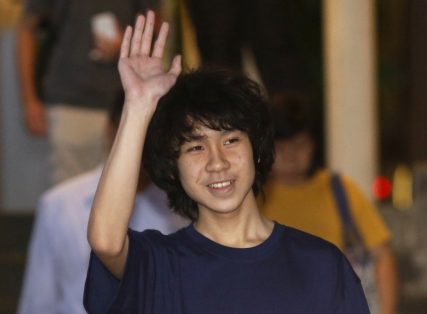
Amos Yee waves as he leaves the State Courts after his trial in Singapore May 12, 2015. A Singapore court on Tuesday found the teenager guilty of offending Christians and spreading obscene image in an online post that also carried comments celebrating the death of former prime minister Lee Kuan Yew. REUTERS/Edgar Su
On Tuesday, Singapore’s Prime Minister Lee Hsien Loong unveiled plans for a new Harmony in Diversity Museum aimed at promoting religious tolerance. The very same day, a Singapore court found 16-year-old blogger Amos Yee guilty of insulting religious feelings on YouTube.
The air-conditioned nation* has long justified sacrificing diversity of thought and opinion in order to maintain “social harmony” — by which of course it means control.
For its small size, the island city-state is indeed religiously and ethnically diverse. This diversity has at times led to conflict, a fact the government consistently exploits to restrict potentially divisive speech and criticism of its authority. Let’s look at some laws:
- Singapore’s Internal Security Act allows anyone “acting in any manner prejudicial to the security of Singapore” to be detained without trial.
- The Maintenance of Religious Harmony Act allows restraining orders to be placed on those who make insensitive remarks about a religion.
- The Sedition Act brings hefty jail sentences and fines for expressing “ill will or hostility between the races and classes.”
- The Penal Code offers up jail time for “wounding the religious or racial feelings of any person” or knowingly promoting “disharmony or feelings of enmity, hatred or ill-will between different religious or racial groups.”
These and other laws have a severe chilling effect on Singapore’s citizens and media.
Freedom House considers press in the country “not free” due to onerous licensing requirements and hefty restrictions. Newspaper, radio and television outlets regularly self-censor offense before delivering news to the masses, but cleansing the Internet of dissent has proven more difficult.
Which is where Amos Yee comes in.
Days after Singapore’s first prime minister Lee Kuan Yew died in March, Yee, a young outspoken government critic, articulately attacked the founding father’s legacy on his popular YouTube channel.
Yee’s rant, crude and somewhat repetitive, is deliberately provocative. It begins with a direct challenge to current Prime Minister Lee Hsien Loong:
“Why hasn’t anyone said, ‘Fuck yeah, the guy is dead?’ … Because everyone is scared. Everyone is afraid that if they say something like that, they might get into trouble … But I’m not afraid. So if Lee Hsien Loong wishes to sue me, I will oblige to dance with him. Come at me, mother fucker.”
Yee goes on to badmouth Lee Kuan Yew by comparing him to Jesus Christ:
“They are both power hungry and malicious but deceive others into thinking that they are compassionate and kind. Their impact and legacy will ultimately not last as more and more people find out that they’re full of bull. And Lee Kuan Yew’s followers are completely delusional and ignorant and have absolutely no sound logic or knowledge about him that is grounded in reality, which Lee Kuan Yew very easily manipulates, similar to the Christian knowledge of the Bible and the work of a multitude of priests.”
That unflattering comparison was enough to convict Yee of “insulting religious feelings,” a charge as vague as it is subjective.
We might dismiss Yee’s tactic and tenor as childish (he is, after all, a 16-year-old child), but the government of Singapore’s heavy-handed reaction has also been immature.
A mature liberal democracy wouldn’t threaten a minor with three years in prison for possibly hurting someone’s feelings. Nor would it force media outlets to scrub any sign of dissent before misinforming a deliberately sheltered public.
Singapore’s laws do more to insulate the government from criticism than they do to protect religious and ethnic communities. If anything good has come from Amos Yee’s conviction it is that this reality, anathema to both freedom of expression and freedom of religion or belief, has been exposed.
*An unpublished article by Cherian George provides much of the legal background in this post.





